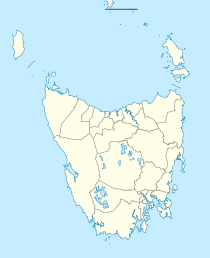Hampshire, Tasmania facts for kids
Quick facts for kids HampshireBurnie, Tasmania |
|||||||||||||||
|---|---|---|---|---|---|---|---|---|---|---|---|---|---|---|---|
| Population | 51 (2016 census) | ||||||||||||||
| Postcode(s) | 7321 | ||||||||||||||
| Location | 30 km (19 mi) SW of Burnie | ||||||||||||||
| LGA(s) | Waratah Wynyard, Burnie | ||||||||||||||
| Region | North-west and west | ||||||||||||||
| State electorate(s) | Braddon | ||||||||||||||
| Federal Division(s) | Braddon | ||||||||||||||
|
|||||||||||||||
Hampshire is a small, mostly rural area in Tasmania, Australia. It's located about 30 kilometers (about 18 miles) south-west of the town of Burnie. In 2016, only 51 people lived in Hampshire, making it a very quiet place. It's part of two local government areas: Waratah Wynyard and the City of Burnie.
Contents
History of Hampshire
Hampshire officially became a recognized area, or "locality," in 1973.
Early European Settlement
Europeans first settled in Hampshire in the late 1820s. Surveyors from the Van Diemen's Land Company thought the open plains would be great for grazing sheep. However, they were mistaken. The open land was actually created by Aboriginal people who had been burning the natural temperate rainforest for many generations. This land turned out to be completely unsuitable for sheep farming.
Land Use Over Time
Even though it wasn't good for sheep, Hampshire's soil is quite fertile. Over the years, it has been used for different types of farming. Today, most of the land is used for growing trees in timber plantations.
Hampshire's Post Office
Hampshire even had its own Post Office. It opened on January 10, 1921, and served the community for many years before closing in 1969.
Woodchip Industry
Hampshire was once home to a woodchip export mill. This mill processed eucalypt tree leftovers from forests. These woodchips were then sent to Japan. There, they were used to make paper pulp, which is a key ingredient in making paper.
Geography of Hampshire
Hampshire is surrounded by several rivers that form its natural borders.
Rivers in Hampshire
- The Blythe River makes up most of Hampshire's eastern border.
- The Hellyer River forms most of the western border and part of the southern border.
- The Emu River flows right through Hampshire, moving from the south-west to the north-east.
Roads in Hampshire
Getting around Hampshire is made possible by a few main roads.
Major Roads
- The Ridgley Highway (known as B18) runs through Hampshire. It travels from the north-east to the south-west.
- Route C102, also called Upper Natone Road, starts at an intersection with the B18 and heads east out of the area.
- Route C103, known as Talunah Road, also begins at an intersection with the B18 but travels west until it leaves Hampshire.


